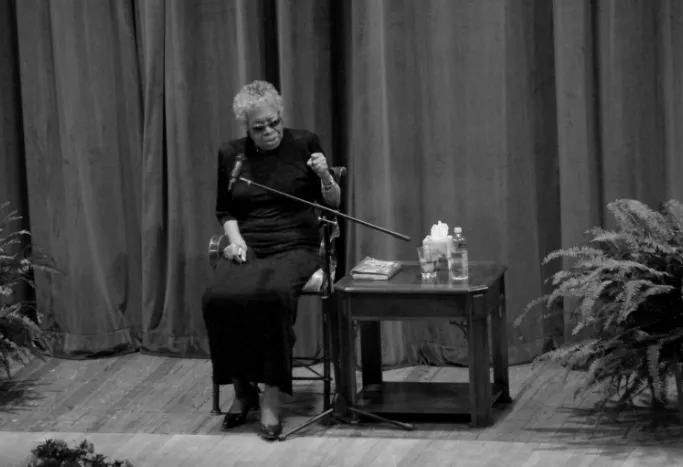Writing fiction or nonfiction and publishing your work is one of the most satisfying feelings a person can have.
When I write, I get completely lost in the process, and every time I read it, I uncover new things that I hadn’t even considered when I was writing.
But writing is also tricky and fraught with self-doubt and fear.
So, how do some of the world’s most famous writers create such notable works of art?
How do they overcome their fears?
#1 Maya Angelou
I’ve learned that people will forget what you said, people will forget what you did, but people will never forget how you made them feel. — Maya Angelou

Books:
I Know Why the Caged Bird Sings
“I have kept a hotel room in every town I’ve ever lived in. I rent a hotel room for a few months, leave my home at six, and try to be at work by six-thirty. To write, I lie across the bed, so that this elbow is absolutely encrusted at the end, just so rough with callouses. I never allow the hotel people to change the bed, because I never sleep there. I stay until twelve-thirty or one-thirty in the afternoon, and then I go home and try to breathe; I look at the work around five; I have an orderly dinner-proper, quiet, lovely dinner; and then I go back to work the next morning.” — The Paris Review
#2 Barbara Kingsolver
Books:
“I tend to wake up very early. Too early. Four o’clock is standard. My morning begins with trying not to get up before the sun rises. But when I do, it’s because my head is too full of words, and I just need to get to my desk and start dumping them into a file. I always wake with sentences pouring into my head. So getting to my desk every day feels like a long emergency. It’s a funny thing: people often ask how I discipline myself to write. I can’t begin to understand the question. For me, the discipline is turning off the computer and leaving my desk to do something else.
“I write a lot of material that I know I’ll throw away. It’s just part of the process. I have to write hundreds of pages before I get to page one.
“For the whole of my career as a novelist, I have also been a mother. I was offered my first book contract, for The Bean Trees, the day I came home from the hospital with my first child. So I became a novelist and mother on the same day. Those two important lives have always been one for me. I’ve always had to do both at the same time. So my writing hours were always constrained by the logistics of having my children in someone else’s care. When they were little, that was difficult. I cherished every hour at my desk as a kind of prize. As time has gone by and my children entered school it became progressively easier to be a working mother. My oldest is an adult, and my youngest is 16, so both are now self–sufficient — but that’s been a gradual process. For me, writing time has always been precious, something I wait for and am eager for and make the best use of. That’s probably why I get up so early and have writing time in the quiet dawn hours, when no one needs me.
“I used to say that the school bus is my muse. When it pulled out of the driveway and left me without anyone to take care of, that was the moment my writing day began, and it ended when the school bus came back. As a working mother, my working time was constrained. On the other hand, I’m immensely grateful to my family for normalizing my life, for making it a requirement that I end my day at some point and go and make dinner. That’s a healthy thing, to set work aside and make dinner and eat it. It’s healthy to have these people in my life who help me to carry on a civilized routine. And also to have these people in my life who connect me to the wider world and the future. My children have taught me everything about life and about the kind of person I want to be in the world. They anchor me to the future in a concrete way. Being a mother has made me a better writer. It’s also true to say that being a writer has made me a better mother.” — The Daily Beast
#3 Haruki Murakami
Books:
Colorless Tsukuru Tazaki and His Years of Pilgrimage: A Novel
“When I’m in writing mode for a novel, I get up at 4:00 am and work for five to six hours. In the afternoon, I run for 10km or swim for 1500m (or do both), then I read a bit and listen to some music. I go to bed at 9:00 pm. I keep to this routine every day without variation. The repetition itself becomes the important thing; it’s a form of mesmerism.
I mesmerize myself to reach a deeper state of mind. But to hold to such repetition for so long — six months to a year — requires a good amount of mental and physical strength. In that sense, writing a long novel is like survival training. Physical strength is as necessary as artistic sensitivity.”
— S. 2004
#4 Stephen King
Books:

“There are certain things I do if I sit down to write,” he said. “I have a glass of water or a cup of tea. There’s a certain time I sit down, from 8:00 to 8:30, somewhere within that half hour every morning,” he explained. “I have my vitamin pill and my music, sit in the same seat, and the papers are all arranged in the same places. The cumulative purpose of doing these things the same way every day seems to be a way of saying to the mind, you’re going to be dreaming soon.
“It’s not any different than a bedtime routine,” he continued. “Do you go to bed a different way every night? Is there a certain side you sleep on? I mean I brush my teeth, I wash my hands. Why would anybody wash their hands before they go to bed? I don’t know. And the pillows are supposed to be pointed a certain way. The open side of the pillowcase is supposed to be pointed in toward the other side of the bed. I don’t know why.” — Haunted Heart by Lisa Rogak
#5 Stephanie Meyer
Books:
“My writing process has morphed mostly in smallish ways — for example, I have a hard time writing to music with words now. I usually listen to classical music and movie scores. I save the metal for editing.
“I can never get truly immersed in writing during the daytime. I know it’s a product of being interrupted by work calls and emails, children’s and husband’s questions about where fill-in-the-blank is located, and the dog’s bladder needs.
“Subconsciously my brain believes that there is no point in trying to focus when my office door is just about to slam open in three…two…one…. So now, even when I’m in a quiet, private environment, I can’t make my brain accept that it is possible to write while the sun is out. When I’m in the middle of a story, I do my self-editing during the day. That part handles interruptions better.”
#6 Jack Kerouac
Books:
“I had a ritual once of lighting a candle and writing by its light and blowing it out when I was done for the night … also kneeling and praying before starting (I got that from a French movie about George Frideric Handel) … but now I simply hate to write. My superstition? I’m beginning to suspect the full moon.
“Also I’m hung up on the number nine though I’m told a Piscean like myself should stick to number seven; but I try to do nine touchdowns a day, that is, I stand on my head in the bathroom, on a slipper, and touch the floor nine times with my toe tips, while balanced. This is incidentally more than yoga, it’s an athletic feat, I mean imagine calling me ‘unbalanced’ after that. Frankly, I do feel that my mind is going. So another ‘ritual’ as you call it, is to pray to Jesus to preserve my sanity and my energy so I can help my family: that being my paralyzed mother, and my wife, and the ever-present kitties. Okay?” -The Paris Review
How can you implement these writing habits?
I’ll try to write in bullet points, and you can expand on each one based on your schedule and needs. The top 6 reasons to implement these writing routines are listed below.
- Have a routine
- Get up early
- Health is important to produce productive work
- Set a timer
- Have a daily quota in mind
- Don’t forget to live your life — family, friends, hobbies
Consistency is the key.




